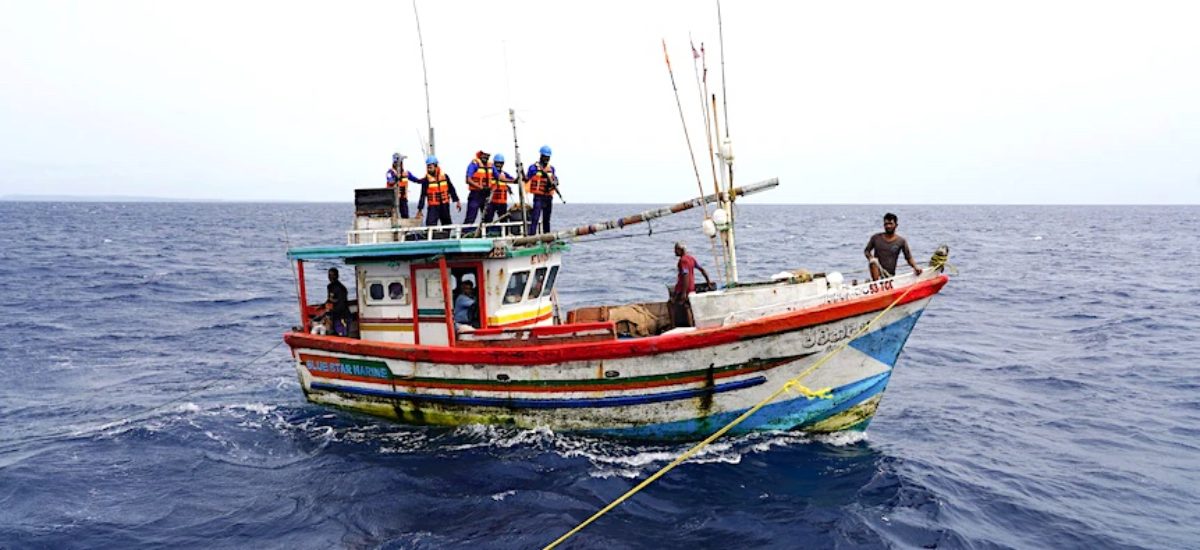Photo courtesy of ABC News
COVID-19 and the severe economic crisis has resulted in an increase in human smuggling, illegal migration and forced labour in Sri Lanka.
People are heavily in debt after taking loans to tide them over the hard times. Small entrepreneurs have gone bankrupt, farmers lost production due to the organic fertiliser fiasco, the construction industry has collapsed, the hotel sector went into decline and garment workers have been lost overtime income; desperation has forced people to take risks and fall victim to human trafficking and illegal migration.
Trapped in their homes, children resorted to the internet for entertainment and fell prey to online sex traffickers.
Internally, factory workers were forced into the sex trade to supplement their incomes while rising costs meant that estate workers could not survive on their wages and had to depend on unscrupulous job agencies to find them work in cities.
“The youth feel that the country is not good for them so they try to flee abroad for a better future. This has led to an increase in human smuggling,” said Harsha Jayarathne, Chairman of Social Advancement for Family Empowerment (SAFE) Foundation that works to combat Trafficking in Persons (TIP) and guarantee safe migration for foreign job seekers.
The International Labour Organisation (ILO) has estimated there are 24.9 million victims of human trafficking around the world. The terms forced labour and modern day slavery are also used to describe TIP that includes commercial sexual exploitation and forced labour exploitation by the private sector and the state.
Of the 24.9 million estimated victims of trafficking, the ILO found that there were about 20.1 million victims of labour trafficking globally. This includes any person who has been forced to work or perform a service under threats of penalty or harm. Of these, 9.2 million were men, 10.9 million were women and 3.3 million were children.
The ILO also estimated there were 4.8 million sex trafficking victims experiencing commercial sexual exploitation around the world. This category includes adults who involuntarily participate in the sex industry and children experiencing commercial sexual exploitation. Of these, 3.8 million were adults and 1 million were children. Globally, 99% of victims were women and girls.
Sri Lanka is a country of origin and a transit and a destination country for victims of trafficking. Men, women and children are trafficked from Sri Lanka to the West, South East and South Asian countries and to Europe for commercial sexual exploitation and forced labour. A small number of women from South East and South Asia and the former Union of Soviet Socialist Republics are trafficked into Sri Lanka for commercial sexual exploitation, according to the UN.
Mr. Jayarathne cites the lack of knowledge and awareness about the exact nature of TIP among the police, judiciary, government officials and the public has contributed to the ongoing crisis of TIP. “People are experiencing it in their daily lives but they don’t realise it,” he said. According to a study carried out by SAFE, 76 percent of people did not know about safe migration while 72 percent did know what human trafficking entailed.
While the government recorded just 28 cases of TIP in 2022, SAFE has evidence of 322 cases in the past month. SAFE works in 12 districts with 120 grass roots partners to educate people on the meaning of human trafficking and illegal migration.
There are four pillars to stop TIP – prevention, prosecution, partnership and protection. The Anti-Human Trafficking Task Force (NAHTTF) was established in 2010 to coordinate the efforts to combat human trafficking among 19 stakeholders. It comes under the Ministry of Defence and calls for a victim-centred approach to TIP along with strengthening coordination and partnerships with government, NGOs and the private sector.
Sri Lanka has two main criminal laws relating to trafficking – the Convention on Preventing and Combating Trafficking in Women and Children for Prostitution and the Penal Code. Despite strengthened criminal laws to combat human trafficking, the number of recorded criminal investigations and prosecutions was small, according to the UN.
In its 2022 report on TIP, the US government upgraded Sri Lanka to Tier 2 because, although it does not fully meet the minimum standards for the elimination of trafficking, the country was making efforts to do so. “These efforts included slightly increasing investigations, including of several Sri Lankan officials allegedly involved in child trafficking, and establishing a specialized unit to strengthen trafficking investigations. The government identified more victims, including among migrant workers exploited abroad,” the report said.
“However, the government did not meet the minimum standards in several key areas. The government prosecuted fewer trafficking cases, and sentences for convicted traffickers remained inadequate. Law enforcement efforts against labor trafficking were disproportionately low compared with the number of identified labor trafficking victims. The capacity of local officials to identify trafficking victims remained low, especially among women in commercial sex. The government did not effectively address vulnerabilities to trafficking faced by migrant workers, including high worker-paid recruitment fees, largely unregulated sub-agents, and policies and procedures that undermined safe and legal migration,” it added.
The goal, Mr Jayarathne said, was to work together and be upgraded to Tier 1 and to prevent being put down into the watch list.

